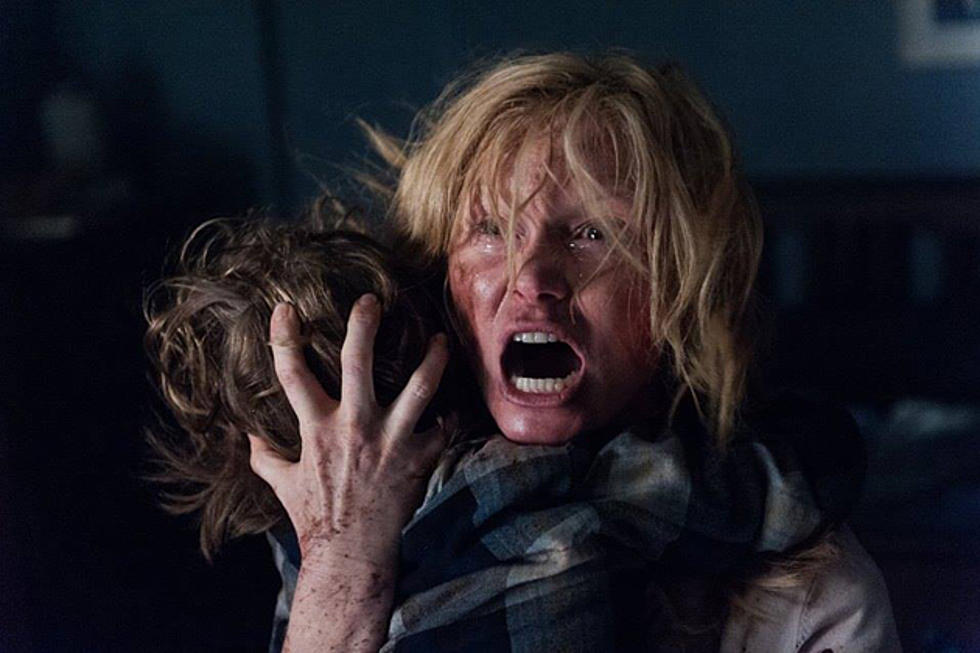
‘The Babadook’ Evokes ‘The Shining’ With a Strong Female Presence
It's become increasingly rare for horror films to make an effort to truly scare us these days, but Jennifer Kent's 'The Babadook' gets under the skin in ways that are both visceral and highly emotional. A mediation on a mother's grief and the displacement of that grief onto her son, the film echoes Stephen King's 'The Shining' in many ways, while lead actress Essie Davis gives a chill-inducing performance evocative of vintage Sissy Spacek and Mia Farrow.
Davis plays Amelia, a single mother who's been so absorbed in raising her young son that she's wholly ignored grieving for the loss of her husband who died on the eve of her son's birth. In subtle ways she's displaced this grief onto her son, Samuel, who has developed peculiar preoccupations with monsters and magic, and when the pair uncover a mysterious book titled 'Mister Babadook,' the grief that's been lying in wait to consume Amelia begins to bubble over and break her fragile sanity, embodied by a terrifying creature who refuses to be ignored.
'The Babadook' is in so many ways the female answer to Stephen King's 'The Shining' -- more the classic novel than Stanley Kubrick's iconic film of the same name, although the climax of 'The Babadook' is reminiscent of Jack Nicholson's iteration of Jack Torrance terrorizing his wife and son. King's 'The Shining' was a rumination on the demons that we carry with us and repress, the way we displace our suffering onto those we love and how mental illness in confined spaces can be viral, all-consuming, and ultimately violent and highly destructive.
Similarly, Jennifer Kent's 'The Babadook' explores the way that a mother represses her grief instinctively, out of the necessity to care for her son. That grief becomes a monster, embodied by the elegantly designed Mister Babadook, much like Jack Torrance's personal demons (alcoholism, his cycle of abuse) were embodied by the demons possessing the Overlook Hotel. As Amelia and Samuel become more and more sleepless, they trap themselves in their home together, letting their mania feed off of one another in a terrifying and increasingly unhealthy symbiotic relationship.
King's 'The Shining' is his most beautiful and personal story, and as such, remains his most terrifying. It's easy to craft jump scares or come up with a gimmick to lure audiences in -- what's more difficult is getting under their skin in a way that's so personal that it becomes horrifying. This is the same reason why Kent's 'The Babadook' works so well: not only has she created a visually striking film, but one that asks us to empathize with feelings of loss and grief, the struggle of a mother to help her son when she's been ignoring herself and her own deep sadness for so long. It asks us to empathize with a little boy who never knew his father and must deal with the loss of a stranger he's supposed to know and love, and coping with his mother's elusive grief every day while still trying to just be a normal little boy. 'The Babadook' hits every beat just right: it's atmospheric, creepy, and exceptionally emotional. There's something both very classic about it, like 'The Shining' and 'Poltergeist,' but also something provocative and inventive, too.
Like 'We Need to Talk About Kevin,' the film also dares to subtly ponder if maternal love is innate or by choice, a horrific but strikingly honest concept that's unfortunately considered a brazen one to tackle.
Of course, the need for more female filmmakers is an ongoing conversation and a fight that feels endless, so it's a wonderful experience to sit at a festival and watch a new film from a female director with a strong perspective like Kent, a woman with a voice and a point of view that's so instantly powerful and intriguing. It just feels like such a celebratory moment, and she's definitely one for which to keep an eye out.
More From ScreenCrush









